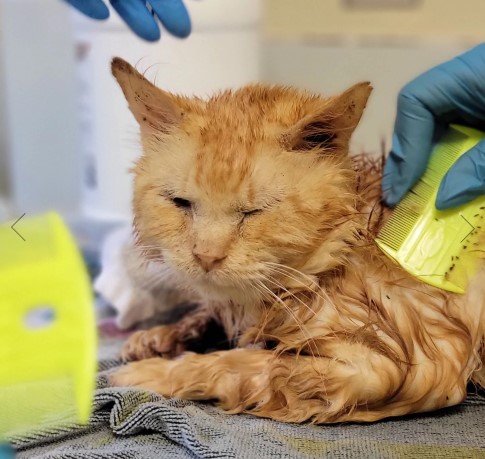Warning: This story contains images that may upset and trigger some readers. Discretion is advised.

Three chihuahuas and 120 cats were seized from a Fort St. James trailer where they’d been living in what the BC SPCA has described as “filthy and unsafe” conditions.
READ MORE: SPCA calls on B.C. veterinary college to ban ‘unethical’ dog debarking surgery
The BC SPCA said that many of the animals were emaciated and suffering from upper respiratory infections, extreme flea infestations, urine scald, eye infections, dental issues, ear mites and wounds.

“The entryway and hallway to the bedrooms were covered in layers of feces and the entire trailer was very hot and filled with an overwhelming ammonia smell due to the build-up of urine,” said Eileen Drever, senior officer for protection for the BC SPCA, in a press release.
“The feces and urine were so thick that boot covers were pulled off within a couple of steps due to the stickiness.”

Get weekly health news
Drever says the majority of the cats were hiding in kitchen cupboards, under the fridge and under furniture in the trailer. There was no water and dry cat food had been scattered on the detritus-packed floor.
“Many of the cats appeared very hungry and came up to our officer upon initial entry and immediately began eating the food that was offered,” Drever said.

The three Chihuahuas who were seized are being treated for dental disease, hair loss and grooming issues.
In addition to the animals seized from the Fort St. James property, the BC SPCA located 130 cat carcasses in freezers behind a trailer where the same individuals had resided in Vanderhoof.

“Any time we are dealing with situations of animal hoarding it is devastating for both the animals and the people,” Drever says. “We are just so glad that we were called in time to rescue the remaining animals.”
The seized cats and dogs are being cared for at SPCA shelters and will continue to receive ongoing veterinary treatment.
“Our animal protection officers have been responding to many large-scale cases like this in recent months, which puts a lot of pressure on our resources as our shelters are already very busy,” Drever says.
“The BC SPCA is grateful for anyone who can donate to help off set the cost of caring for these animals.”





Comments
Want to discuss? Please read our Commenting Policy first.